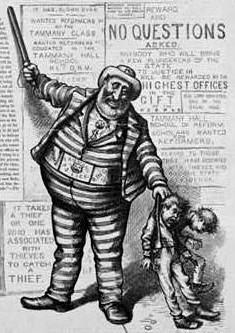Posted by GET NY on 07:23:09 01/03/05
Prosecuted pol finds an ally
League of Women Voters sides with John O'Hara
By Matthew Sweeney
The Brooklyn Papers
May 1, 2000
John O'Hara has been tried three times for the same crime, an unusual one for a criminal prosecution - that his official voting address was not his permanent address.
The perennial candidate for public office has been convicted once - which was overturned on appeal - he has hung a jury and he has been convicted once again.
"Most people in my situation would, have killed themselves by now," said O'Hara of his three-year ordeal.
In May, O'Hara, who has several times run for public office from Sunset Park, will appeal his latest conviction. But on his side this time will be the League of Women Voters, which on April 4 filed an "amicus curiae" or "friend of the court" brief on his behalf.
A spokesman for Brooklyn District Attorney Charles Hynes, Kevin Davitt, declined to comment on O'Hara's appeal.
The basis for his appeal is the argument ment that Kings County Supreme Court judge Abe Gerges erred last September when he instructed the jury. that they had to determine whether the 47th Street address in question was O'Hara's "principal and permanent address." Gerges' has one of the lowest records of overturned decisions in the: court.
"It's true 47th Street was not my 'principal and permanent' address," O'Hara told The Brooklyn Papers last week. He had registered to vote using a 47th Street address when the district lines changed, putting his 61st Street apartment outside of the 5lst Assem bly District..
Using civil court precedents, Ferguson vs. McNab and Laboni vs. Sunderland, O'Hara will try to
convince a panel of four justices headed by Justice Sondra Miller, in the state's highest court that the definition of residence is one that has "legitimate, significant and continuing at
tachments."
The League of Women Voters has backed O'Hara's appeal on the basis of the organization's goal to "encourage citizen participation in the electoral process," according to their counsel, Peter Sweeney.
"It is undeniable that many citizens in this state maintain multiple residences," wrote Sweeney in their brief. "The League believes that affirming the trial court's instructions on residence would deter these citizens from participating in the electoral process, for fear that if they chose what a prosecutor purported to be an incorrect voting residence, they could become convicted felons."
Two of the three juries O'Hara has faced, after hearing days of testimony, sent a request to have the legal definition of residence read back to them.
"It's the only issue in the whole case," O'Hara said.
That may be a problem for him, because criminal cases demand a stronger proof of the "principal and permanent address" than do civil charges. O'Hara's appeal is based in large part on civil court precedents of election law.
Therein lies O'Hara's problem: "There's never been a case like this," he said.
One of the only known instances of criminal charges for filing a false instrument for voting purposes was brought against Bernard Ramos, who was charged in 1994 with using a secondary address in order to run for a Bronx school board seat in. The charges were dismissed before the opening arguments were heard.
The additional similarity is that both were politically motivated, O'Hara said. He has long claimed his prosecution was politically motivated, a charge that Hynes' office has categorically denied.
Having run for both the Assembly and City Council several times, O'Hara made his share of political enemies, he said, by forcing primaries. O'Hara usually ran in three-way races as the outsider in a fight pitting the reigning Kings County Democratic Club against a local reform club, usually the Central Brooklyn Independent Democrats.
He never got very far.
In 1990, he ran against Assemblyman James Brennan and was knocked off the ballot. In 1992, O'Hara's former campaign manager, John Boyle, ran against Brennan. Boyle was knocked off the ballot, meaning the signatures he needed to secure a place in the primary were discounted.
In 1994, O'Hara ran for Assembly against Felix Ortiz. O'Hara's signatures were challenged. Before the court proceeding was complete, he threw in the towel, and stepped out of the race. The court record was sealed. In 1996, in an election that was marred by voting machines being delivered late, O'Hara ran against Ortiz again. He lost by a landslide. He attempted to get a new election, charging that the voting machines had been delayed. The U.S. Court of Appeals threww it out and he petitioned the U.S. Supreme' Court.
Shortly thereafter he was arrested for voting from a temporary address. The registration and voting in question allegedly occurred between November 1992 and November 1993.
Since his first conviction in July of 1997, O'Hara has completed about 450 of the 1,500 hours of community service he has been sentenced to serve.
Follow Ups:





